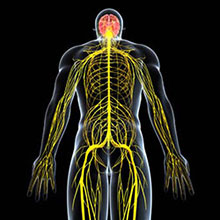Immune System Reset May Halt Multiple Sclerosis Progression
![]()
Immune System Reset May Halt Multiple Sclerosis Progression
MS is an autoimmune disease in which the immune system attacks the central nervous system. It results in damage to nerve fibers, disrupting communication between the brain and the body. The disease’s widely varying symptoms can include tingling or numbness in extremities, motor and speech difficulties, weakness, fatigue, chronic pain, vision loss, and depression.

Although researchers haven’t been able to identify the cause of MS with any certainty, several promising treatment options are under investigation.
The most common form of MS is relapsing-remitting MS (RRMS), in which periods of mild or no symptoms are interspersed with periods of more severe symptoms, called relapses. RRMS can change into a progressive form where symptoms worsen over time without any symptom-free periods. RRMS can be treated with medications that suppress the immune system and reduce inflammation. However, these drugs can cause serious side effects.
One promising treatment for MS is HDIT/HCT (high-dose immunosuppressive therapy with autologous hematopoietic cell transplant). The goal of this treatment is to “reset” the immune system so that it will cease attacking the central nervous system. First, a patient’s hematopoietic stem cells (HSCs)—precursor cells that develop into blood cells—are collected. High-dose chemotherapy and other drugs are then used to deplete the patient’s immune system. Finally, the patient is infused with his or her own HSCs, which develop into red and white blood cells to re-establish the patient’s immune system.
Past clinical trials have suggested that HDIT/HCT may not work in patients with later-stage, progressive MS who already show marked neurodegeneration. However, the approach might be effective in patients with early-stage RRMS. Researchers from across the country are monitoring 24 volunteers with RRMS for 5 years following HDIT/HCT treatment. The clinical trial is funded by NIH’s National Institute of Allergy and Infectious Diseases (NIAID). Interim 3-year findings appeared online on December 29, 2014, in JAMA Neurology.
Three years after HDIT/HCT treatment, nearly 80% of trial participants had survived without an increase in disability, relapse of MS symptoms, or new brain lesions. Patients didn’t receive any MS drugs during those 3 years. Few serious early complications or unexpected side effects occurred. Many participants experienced issues that typically accompany high-dose immunosuppressive therapy, such as infections and gastrointestinal problems.
“These promising results support the need for future studies to further evaluate the benefits and risks of HDIT/HCT and directly compare this treatment strategy to current MS therapies,” says NIAID Director Dr. Anthony S. Fauci.
The researchers plan to follow participants for a total of 5 years. Final results from this and similar studies will help inform the design of larger trials to further evaluate HDIT/HCT in people with MS.
###
* The above story is reprinted from materials provided by National Institutes of Health (NIH) ** The National Institutes of Health (NIH) , a part of the U.S. Department of Health and Human Services, is the nation’s medical research agency—making important discoveries that improve health and save lives. The National Institutes of Health is made up of 27 different components called Institutes and Centers. Each has its own specific research agenda. All but three of these components receive their funding directly from Congress, and administrate their own budgets.



















